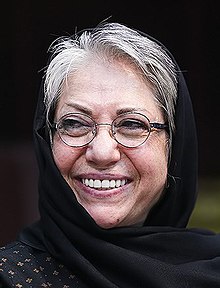Rakhshan Bani-E'temad
| رخشان بنیاعتماد Rakhshan Bani Etemad |
|
|---|---|
 |
|
| Born |
Rakhshan Bani Etemād April 3, 1954 Tehran, Iran |
| Occupation |
Film director producer screenwriter |
| Spouse(s) | Jahangir Kosari (1979–present) |
| Children | Baran Kosari (b. 1985) |
| Website | http://ayadamha.com |
Rakhshān Bani-Etemad (Persian: رخشان بنیاعتماد, born April 3, 1954 in Tehran, Iran) is an internationally and critically acclaimed Iranian film director and screenwriter. She is widely considered as premier female director, and her films have been praised at international festivals as well as being remarkably popular with Iranian critics and audiences. Her title as “First Lady of Iranian Cinema” is not only a reference to her prominence as a filmmaker, but it also connotes her social role of merging politics and family in her work.
Rakhshan Bani-Etemad was born into a middle-class family. While her parents wanted her to pursue a career in teaching, Bani-Etemad demonstrated an interest in film from a young age. As a teenager, she had decided to study film. She received her Bachelor of Arts degree in film studies from the Dramatic Arts University in Tehran.
Shortly after completing her degree, Bani-Etemad began working for the Iranian television network IRIB (Islamic Republic of Iran Broadcasting), where she began directing television documentary features. Her features are steeped in the social and economic problems of Iran.
Bani-Etemad did not receive immediate praise upon entering the film industry. Her early feature films were met by harsh criticism. However, she finally earned critical and popular success in 1991 with her film Nargess. She received the Best Director Award from the Fajr Film Festival, marking the first time in the history of the festival that a woman was awarded the Best Director prize. Since then, she has received numerous awards for her films, including a Bronze Leopard Award for her film The Blue-Veiled at the 1995 Locarno Film Festival.
Since she began making films in 1978, she has come to exemplify her own unique style. Bani-Etemad’s films are considered socially and politically conscious social documentaries. She aims to reflect the realities of Iranian people’s daily life experiences. Her documentaries are centered on issues of poverty, criminality, divorce, polygamy, social norms, cultural taboos, women’s oppression, and cultural expectations.
Her 2001 film Under the Skin of the City was entered into the 23rd Moscow International Film Festival where it won the Special Golden St.George. The following year she was a member of the jury at the 24th Moscow International Film Festival.
...
Wikipedia
